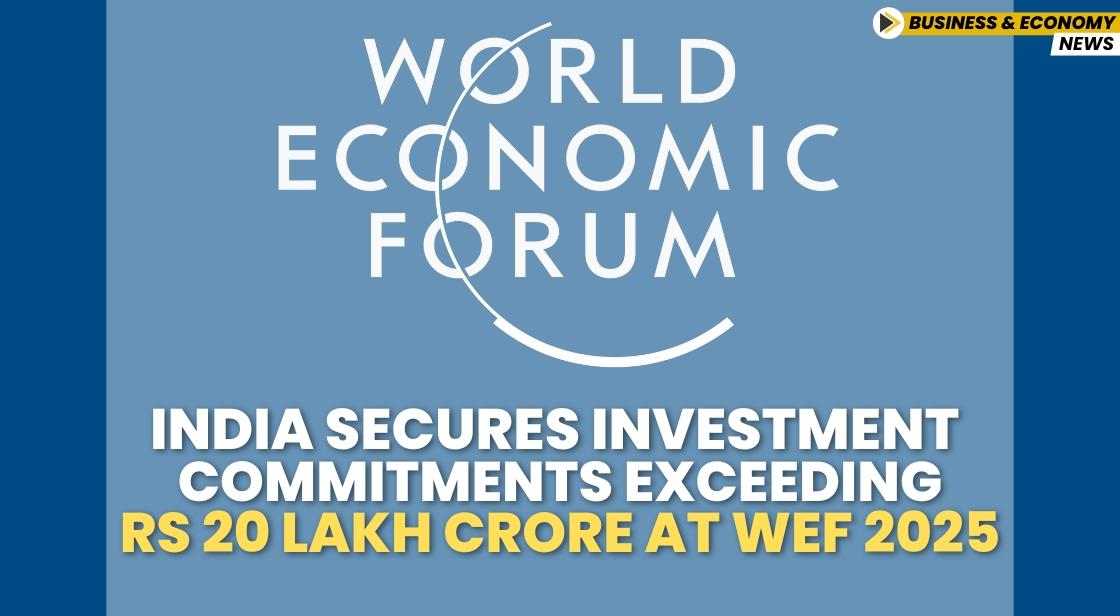India Secures Investment Commitments Exceeding Rs 20 Lakh Crore at WEF 2025

News Synopsis
In a clear demonstration of its economic strength, despite global geopolitical uncertainties, India secured investment commitments exceeding ₹20 lakh crore during the 2025 World Economic Forum (WEF) summit in Davos. This achievement is a testament to India’s growing influence on the global economic stage and its role as an attractive investment destination.
Maharashtra Leads with Largest Share of Investments
Maharashtra emerged as the dominant player, securing nearly 80% of the total investment proposals at the WEF summit. Under the leadership of Chief Minister Devendra Fadnavis, Maharashtra signed 61 Memorandums of Understanding (MoUs), amounting to ₹15.7 lakh crore. These agreements are expected to generate over 16 lakh jobs, reinforcing Maharashtra’s position as a key economic powerhouse in India.
Other States Follow Suit with Significant Investments
Apart from Maharashtra, other Indian states also showcased their investment potential and secured notable commitments:
-
Telangana: The state, led by Chief Minister K. Chandrashekar Rao, signed 20 MoUs worth ₹1.80 lakh crore.
-
Kerala and Uttar Pradesh: Both states presented their ambitious future plans, attracting substantial investment offers.
-
Andhra Pradesh: Chief Minister N. Chandrababu Naidu met with global CEOs and international business leaders, discussing investment opportunities and solidifying partnerships.
These states collectively underscore India’s diverse investment opportunities across various sectors and regions.
Infosys Expands Presence with New Job Opportunities
During the WEF summit, IT giant Infosys also made an announcement to expand its operations in Hyderabad, further contributing to India’s job creation efforts. The expansion is expected to create 17,000 new jobs, highlighting the growing role of technology and IT companies in India’s economic development.
Ashwini Vaishnaw Highlights India’s Balanced Economic Growth
Union Minister for Railways and Electronics & IT, Ashwini Vaishnaw, addressed the summit, emphasizing India’s balanced approach to economic development. He highlighted that both manufacturing and services are driving the country’s growth. Vaishnaw outlined India’s transformation from focusing solely on import substitution to adopting a “Make in India, Make for the World” policy, showcasing the nation’s growing strength in global manufacturing.
India’s Ascent in the Semiconductor and AI Sectors
Vaishnaw also spoke about India’s rise in the semiconductor and artificial intelligence (AI) sectors. He pointed out that leading semiconductor industry experts predict India will soon be among the top three global destinations for semiconductor manufacturing. Additionally, with nearly 2,000 Global Capability Centers (GCCs) focused on advanced semiconductor designs, India is poised to become a key player in global manufacturing.
Becoming the “Use Case Capital” of the World
Further emphasizing India’s role in global innovation, Vaishnaw stated that the country has the potential to become the “use case capital” of the world. By developing innovative applications for industries worldwide, India can position itself as a leader in creating tailored solutions for various sectors. Vaishnaw also highlighted the importance of focusing on AI use cases and applications, rather than just commoditized AI models, to stay ahead in the global tech race.
Government’s Focus on Skilling for Emerging Technologies
The Union Minister also reiterated the government’s focus on skilling India’s workforce for emerging technologies. As AI and other advanced technologies continue to evolve, preparing India’s talent pool to meet these demands is crucial. Through targeted training and educational initiatives, the government aims to empower the workforce to thrive in the tech-driven economy of the future.
Conclusion: India’s Economic Strength and Global Position
India’s performance at WEF 2025 signals the nation’s increasing influence in the global economy. The investment commitments secured, particularly in key sectors like manufacturing, technology, and AI, position India as a global leader. The country’s balanced growth strategy, emphasis on innovation, and focus on workforce development ensure that it will continue to attract global investments and drive economic progress in the years to come.
You May Like









